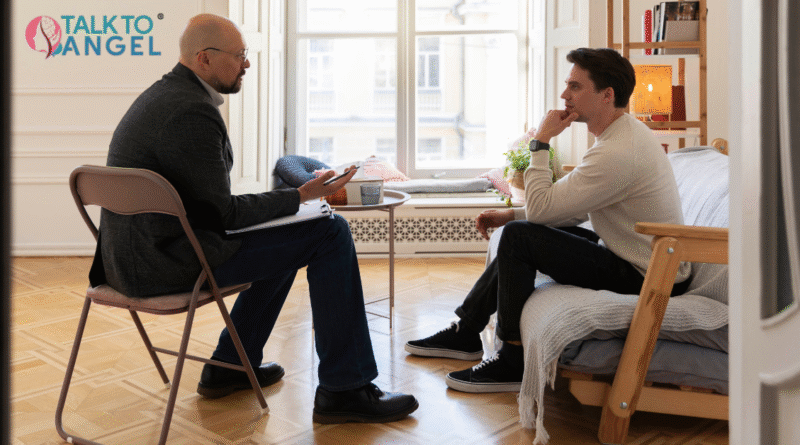Men in Counselling: Breaking Mental Health Misconceptions
In India, where mental health awareness is still emerging from the shadows of stigma and Taboo, one of the lesser-discussed yet critical issues is the underrepresentation of men in the field of mental health counselling. This article explores the role of male counsellors, the reasons behind the gender imbalance, client preferences in therapist gender, and why Psychowellness Center stands out as a vital institution in promoting balanced mental healthcare.
The Role of Men in Mental Health Counselling
Mental health counselling, by nature, demands empathy, active listening, and emotional availability traits stereotypically viewed in many cultures, including India, as more feminine. However, this perception is slowly shifting as men become more involved in the field, bringing unique perspectives and approaches. Male counsellors play an important role in diversifying the therapeutic experience, especially for male clients who may find it easier to open up to someone of the same gender due to shared societal pressures or lived experiences.
Men in counselling can also serve as powerful role models. By embodying emotional intelligence and mental well-being, they challenge the societal expectations that discourage men from expressing vulnerability. In therapy settings, male counsellors help deconstruct traditional masculinity norms and offer clients a safe space to explore their gender identity and emotional struggles without fear of judgment.
Why Are There Fewer Male Therapists in India?
The disparity between male and female best therapists in India is significant. According to anecdotal evidence from clinics and mental health centres, the ratio often leans heavily toward female professionals. Several factors contribute to this imbalance:
1. Cultural and Societal Expectations
Mental health and psychology are still perceived in parts of Indian society as “soft” sciences—more aligned with nurturing roles typically ascribed to women. This discourages men from pursuing psychology as a career. Social conditioning leads many young men to pursue more “masculine” professions like engineering, business, or law, often sidelining mental health as a viable or respected option.
2. Stigma Around Male Emotional Expression
In India, men frequently encounter societal expectations that compel them to conceal their emotions, resulting in a diminished familiarity and comfort with discussions surrounding emotions. This can make the field of counselling seem alien or uncomfortable to pursue professionally. Even those who are interested may be hesitant due to fear of judgment or perceived emasculation.
3. Lack of Representation and Mentorship
With fewer male role models and mentors in mental health professions, aspiring male counselling psychologists lack the guidance and encouragement that might otherwise help them enter and thrive in the field.
4. Educational and Institutional Barriers
Psychology programs in Indian universities often have significantly more female students. This imbalance further perpetuates the notion that mental health is a female-dominated field, subtly discouraging male participation.
Client Preferences: Do Gender Dynamics Matter?
A key question in counselling is whether clients prefer therapists of a particular gender, and the response differs based on individual comfort levels, cultural context, and the specific issues being discussed.
Do Women Reach Out to Male Therapists?
Yes, many women do choose male therapists, especially when they feel a male perspective might help them better understand their interpersonal relationships or male-centric dynamics in their lives. However, women who have experienced trauma, emotional abuse, or sexual harassment at the hands of men may understandably prefer female therapists for safety and comfort.
Do Men Prefer Male or Female Therapists?
Interestingly, many male clients feel more at ease opening up to female therapists. This may be because of the nurturing stereotype often associated with women or because men feel less judged by women when discussing vulnerabilities. However, this is not universally true. Some men actively seek male therapists to talk about issues like masculinity, fatherhood, or societal pressures and related anxiety in a relatable way.
A 2021 study in Frontiers in Psychology noted that gender preference in therapy is often secondary to therapist competence, empathy, and trustworthiness.
Why Consider a Male Therapist?
Male therapists bring distinct value to the therapy space, not as a better alternative, but as an equally important one. Here’s why:
- Gender-sensitive therapy: Male therapists may better understand male-specific societal expectations, especially those related to workplace stress, emotional suppression, and relationship dynamics.
- Encouraging male clients to seek help: Their presence normalises emotional openness among men, encouraging more male clients to pursue counselling.
- Perspective diversity: They offer alternative views on gender roles and relationship dynamics, which can benefit both male and female clients.
- Support for male victims: Men who have experienced abuse or trauma might feel more comfortable discussing their feelings with a male therapist, as they may perceive less risk of judgment or feelings of emasculation.
Psychowellness Center: Leading by Example
A leading mental health facility in India, The Psychowellness Center, has adopted a progressive approach by equalising the presence of men and women among its therapists.
What Makes The Psychowellness Center Unique?
1. Diverse Team of Therapists:
The center boasts a diverse team of male and female psychologists with varied specialisations, allowing clients to choose based on their comfort and the nature of their concerns.
2. Gender-Sensitive Therapy:
The Psychowellness Center is known for its awareness of gender-specific issues. Therapists are trained to provide care that is sensitive to cultural and gender dynamics.
3. Safe and Non-Judgmental Environment:
Clients—regardless of gender—are assured a safe, confidential, and supportive space. Whether you’re a man struggling with emotional expression or a woman navigating relationship issues, the centre emphasises comfort and confidentiality.
4. Outreach and Education:
Through workshops, webinars, and community outreach programs, the center educates the public on mental health, reducing stigma, and encouraging men and women alike to seek support.
5. Online and Offline Accessibility:
Offering both in-person and virtual counselling, the Psychowellness Center ensures accessibility to individuals across geographic and logistical barriers, making it especially valuable in a vast and diverse country like India.
Normalising Mental Healthcare for Men
A key part of increasing male representation in mental health counselling is also increasing the number of men seeking counselling. Breaking this cycle requires cultural shifts, visible role models, and institutions like The Psychowellness Center that actively encourage male participation, both as clients and as professionals.
The center is also vocal about men’s mental health during events like International Men’s Day and Mental Health Awareness Month. By normalising counselling and emphasising mental strength as an asset rather than a weakness. The Psychowellness Center plays an important role in shifting public perception.
Conclusion
As more people embrace counselling, it’s vital to ensure diversity and representation in the mental health profession. Men have a unique and necessary role to play—not just as clients but also as therapists, educators, and advocates. If you are seeking mental health counselling support or are a man considering a career in therapy, now is the time to break the silence. The path to healing and helping starts with one conversation. And that conversation can begin at the Psychowellness Center.
References
- American Psychological Association. (2022). Stress in America 2022: Concerned for the future, beset by inflation. Retrieved from https://www.apa.org/news/press/releases/stress/2022/report
- Mahapatra, D., & Sharma, P. (2021). Gender representation in mental health professionals: An Indian perspective. Indian Journal of Psychology and Mental Health, 15(2), 102–110.
- Mishra, S. (2020). Understanding stigma and seeking help: Mental health challenges among Indian men. Asian Journal of Psychiatry, 48, 101859. https://doi.org/10.1016/j.ajp.2019.101859
- Reddy, V., & Mehrotra, S. (2021). Masculinity, vulnerability, and mental health: Exploring Indian male therapists’ narratives. Journal of Indian Psychology, 39(1), 30–45.




